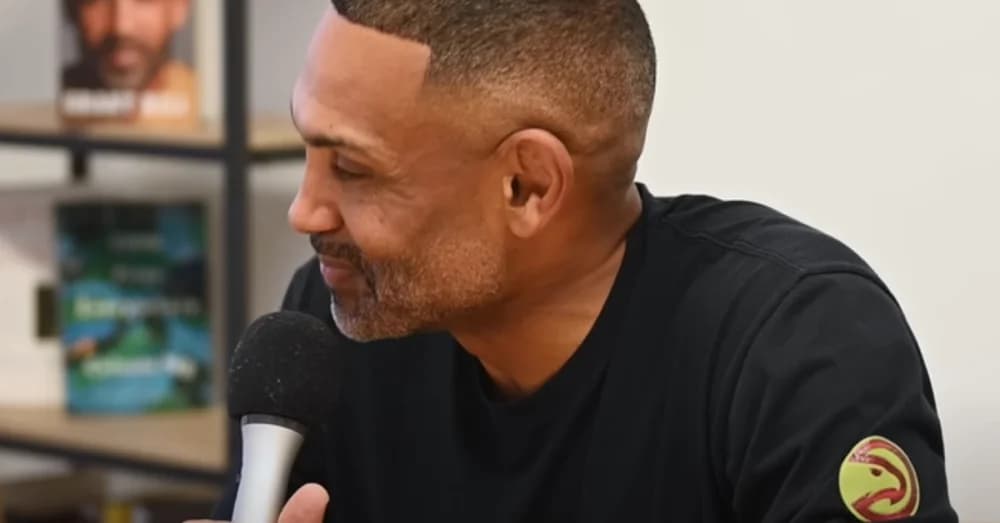Grant Hill Opens Up About Kawhi Leonard’s Controversial Withdrawal from Team USA

In a revealing interview, Team USA Managing Director Grant Hill shed light on Kawhi Leonard’s unexpected withdrawal from the national team, citing a complex situation involving the LA Clippers and Leonard’s ongoing knee issues. The decision, Hill explained, was ultimately made in the best interests of all parties involved.
Leonard, who was replaced by Boston Celtics guard Derrick White, has been grappling with knee problems that resurfaced just before Team USA’s training camp. This development left many fans and analysts puzzled and concerned about the Clippers star’s health and future.
Hill Speaks Out on Leonard’s Withdrawal
Grant Hill faced the media on Wednesday and discussed the delicate process behind Leonard’s exit. “We just felt that we had to pivot, and not to get into the particulars, in terms of what went into the decision, but we just felt it was in our best interest, but also in the Clippers’ and Kawhi’s best interest, to move into a different direction,” Hill stated. “We tried. I think we all tried and we gave it a valiant effort, and unfortunately, we have to move forward. … We did. Ultimately he was sent home, but we were in conversation with the Clippers on that” .
View this post on Instagram
Leonard’s Knee Troubles Continue
Kawhi Leonard’s knee issues are well-documented. He missed the LA Clippers’ final three postseason games against the Dallas Mavericks due to swelling in his knee, marking the third consecutive playoffs marred by injury for Leonard. Moreover, he sat out the entire 2021-22 season following a knee injury sustained in the 2021 playoffs.
Leonard himself admitted that he didn’t return to the court until two weeks before the Team USA training camp. Concerns about his knee were apparent, especially when he was spotted limping during early sessions. Despite participating in scrimmages, Team USA’s medical staff likely noticed something amiss, prompting the decision to replace him.
Grant Hill expressed empathy for Leonard’s plight, drawing on his own experiences with injuries during his playing career. “I think he wanted to be here, like all these guys want to be here, and we don’t take that lightly at all. It speaks to the program and the opportunity,” Hill said. “Personally speaking, I know what it’s like to want to do something and your body’s just not right. And I’ve lived that personally. So I applaud him for coming here and being willing to sacrifice, give up his summer and represent our country and play for our program” .
Following Leonard’s withdrawal, Team USA quickly moved to fill the gap with Derrick White. White, who played briefly alongside Leonard during his rookie year with the San Antonio Spurs, is coming off the best season of his career, having won an NBA championship with the Boston Celtics.
The selection of Derrick White over Jaylen Brown, who was named NBA Finals MVP, surprised many fans. However, Hill and the Team USA staff believed White was a better fit for the team’s needs. The decision sparked a debate among fans and analysts, with some questioning the logic behind picking White over Brown, especially given the roster’s existing depth at the guard position.
Kawhi Leonard’s withdrawal from Team USA raises significant questions about the long-term impact of his knee issues on his career. Leonard’s injury history is a growing concern, not just for the Clippers but for any future team engagements. His situation underscores the challenges athletes face with chronic injuries and the tough decisions teams must make regarding player health and performance.
Grant Hill’s transparent and empathetic approach to handling Leonard’s withdrawal highlights the delicate balance between athlete welfare and team objectives. The move to replace Leonard with Derrick White, while controversial, shows Team USA’s commitment to assembling a cohesive and adaptable squad. As fans and analysts dissect this decision, it’s essential to recognize the complexities involved in managing elite athletes’ health and career trajectories.
In conclusion, Kawhi Leonard’s situation is a stark reminder of the physical toll professional sports can take on athletes. It also underscores the importance of making informed, compassionate decisions in the best interests of players and teams alike. As Team USA gears up for the Olympics, the hope is that they can move past this setback and strive for success with their revamped roster.





